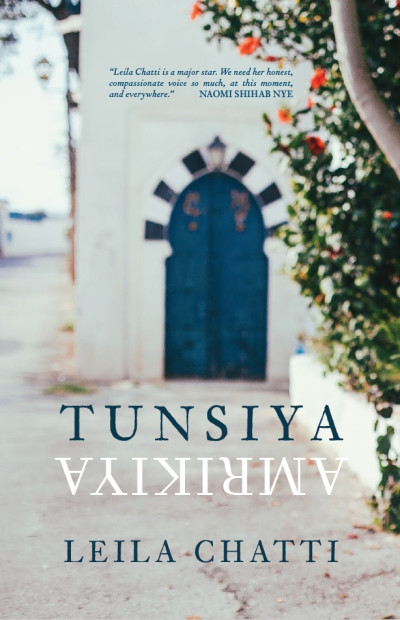A Review of Tunsiya Amrikiya (Bull City Press, 2018) by Leila Chatti
National identity, when not summoned for fatuous patriotism, can spur great poetry. Think of Whitman singing America, and Langston Hughes, too, singing America. “Mad Ireland hurt you into poetry,” Auden claimed of Yeats. Leila Chatti’s captivating chapbook, Tunsiya Amrikiya, explores the fault lines and complex meanings that emerge from dual - and sometimes duelling - claims of citizenship. The title consists of the Arabic words for Tunisian female and American female, and Chatti’s poems address the pleasures and difficulties of being an Arabic woman in this American moment.
‘she spits it out, voice lowered, as if it’s obscene -/Trump - and all of us swallow, even if our mouths are empty.’ The speaker’s mother has dared to invoke that obscene name while the family is ‘at a restaurant,/me and my sister and our Arab father wedged between our white/boyfriends.’ The poem is called “Okay When Are We Going,” which is part of the mother’s question - ‘when are we going/to talk about the elephant in the room’ - but by cutting the sentence where she does, Chatti makes it a response to Trump’s proposed Muslim ban. The poem recalls 9/11 (‘the towers sank/like a heart’) and the fear that has saturated America ever since, giving rise to white supremacy and Islamophobia that culminated in the election of a man who suggested - and has tried to impose - a religious prohibition.
Moving with finesse between the intimacies of family and the signs and symbols of the times, Chatti writes poems that sting and delight. In the collection’s first poem, “Muslim Girlhood,” she echoes Robert Hayden in these lines:
But what did they know of my heart, or my father
who drove fifty miles to buy me a doll like a Barbie
because it looked like me, short brown hair underneath her hijab, unthreatening
breasts and feet flat enough to carry her as far as she wanted
to go?
‘Unthreatening’ stands out at the edge of the line, in those lonely offices of love, trying to reassure both reader and speaker. Chatti breaks it just before ‘breasts,’ and it’s a canny move, tying the word first to ethnicity, then to sexuality. In the following poem, “Religious Education,” Ramadan is connected with desire: ‘each year I learned better//to hunger, my stomach a fist, those long days/of fasting, holy month of appetite, ritual of//anticipation.’ The charm and strength of Chatti’s work derives, in part, from her mastery of caesura and elision, the words and the gaps between the words. In a culture of instant gratification, the words that end “Religious Education” (‘wait, wait, soon’) have the power of prophecy. To be patient, to dwell in memory and the imagination; these are radical acts that Chatti’s poems help us to embody.
Both “Muslim Girlhood” and “Muslim Christmas” interrogate the ways that the dominant cultures in America - white, Christian - fail to celebrate or even accommodate difference. In the first poem it is the speaker’s father who must go on a quest for a doll she can see herself in, while in the latter Chatti writes:
I marveled at how
merciful this man-God could be, Santa Christ, Saint Jesus,
who had found our home and come before the altar
of the unbelieving, stood there in its wavering light,
and left for us chocolate, snow boots, everything we liked.
Elsewhere the poet does not have such pleasant associations with the divine. In “While Reading the News About Orlando, I Hear the Call to Prayer,” she asks, ‘where are you to refuse those/who call out to you, who undo/what you’ve made in your name?’ Nature, too, is fraught: the Mediterranean ‘sealed its blue lips’ in a poem dedicated to the refugees who died at sea attempting to flee Syria. Yet for all the grief that marks these poems, they are bright with hope and with yearning. ‘God,/I want so badly/to speak//with you,’ Chatti writes, calling to mind an earlier north African poet, Augustine of Hippo, who wrote ‘the desire of your heart constitutes your prayer.’ This book announces the emergence of a devotional poet coming to terms with her place in the world, and the world’s place in her.





